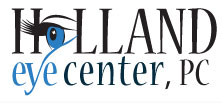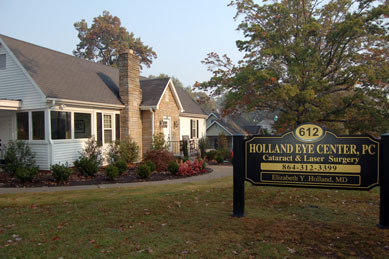Photo Refractive Keratectomy (PRK)
Dr. Elizabeth Holland offers the most effective and technically advanced procedures for photo refractive keratectomy (PRK) excimer laser surgery. PRK was the first procedure performed using the Excimer laser. The difference between LASIK and PRK is that the LASIK procedure involves the creation of a corneal flap is and the laser is applied to the inner tissue of the cornea. With PRK the epithelium (or outer skin of the cornea) is removed and a laser is applied to the surface of the cornea. PRK can be used to correct low to moderate levels of nearsightedness, farsightedness and astigmatism.
PRK is for those who:
- want to reduce or eliminate their dependence on glasses or contacts
- are over 18 years of age
- have had a stable eye prescription for at least one year
- have no health issues affecting their eyes
- have corneas too thin for LASIK
- have large pupils
You will arrive at the laser center for your PRK excimer laser eye surgery about an hour prior to your procedure. Once you have been checked in, you may be offered a sedative to help you relax. You will then be prepared for PRK surgery. The area around your eyes will be cleaned and a sterile drape may be applied around your eyes. Your eyes will be numbed with topical anesthetic eye drops. No injections or needles will be used in this process. When your eyes are totally numb, an eyelid holder will be placed between your eyelids to keep you from blinking during the PRK surgery procedure.
Next, Dr. Holland will gently remove the epithelium. You may feel a little pressure during the PRK surgery process, but absolutely no pain. During the treatment, you will be instructed to stare at the fixation light. The information gathered in your pre-operative examination will be programmed into the laser. The treatment will be completed in less than a minute or two, depending on the amount of correction needed. A bandage contact lens will be placed on the eye for increased comfort postoperatively.
Following your PRK procedure, your eye(s) will be examined with a slit lamp microscope. You will be instructed to wear a shield over your eyes while sleeping for the first week. Your vision may be blurry or hazy for one to five days. You may experience some discomfort as the epithelium heals and covers the treated area. Eye drops and oral pain medication may be necessary to minimize the discomfort. Most patients resume normal activities within one to three days following the PRK procedure. Vision can fluctuate for up to six months.
Only you can make the important decision to have PRK surgery. The goal of any PRK surgery is to reduce your dependence on corrective lenses, however, we cannot guarantee you will experience the results you desire.
Excimer laser surgery has been proven to be a safe, highly effective, and permanent procedure. Any surgical procedure presents an inherent risk. Many complications and risks associated with PRK surgery can be reduced or eliminated through careful PRK surgery patient selection and careful pre-operative testing using the latest laser surgery diagnostic technology.
Some mild visual side effects may be experienced after PRK surgery. However, these visual side effects tend to be mild and diminish over time. Dryness, glare and halos are rare side effects that may present a slight chance of never going away completely.
Each PRK surgery patient heals somewhat differently, and some PRK surgery patients may over correct and some may under correct, resulting in "over corrections" and "under corrections". Within 3 to 6 months the eye will stabilize and, if you have under corrected or over corrected, you and Dr. Holland may discuss whether re-treatment can help fine tune your vision.
Only after a thorough eye exam, will you and Dr. Holland be able to determine if PRK is an option for you. If you prove to be a good PRK surgery candidate, you will be given additional information about the PRK surgical procedure. This will enable you to make an educated decision about whether or not to proceed. It is vitally important to be sure you have all your PRK questions answered to your satisfaction.
Call the Holland Eye Center today to schedule your free refractive surgery consultation with Dr. Holland.




